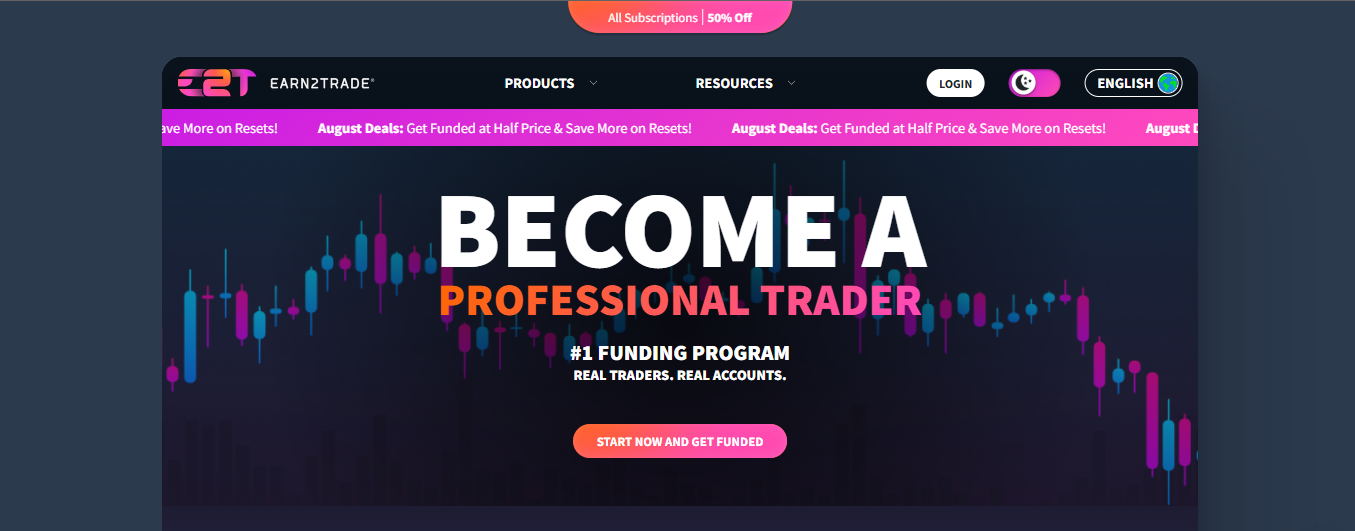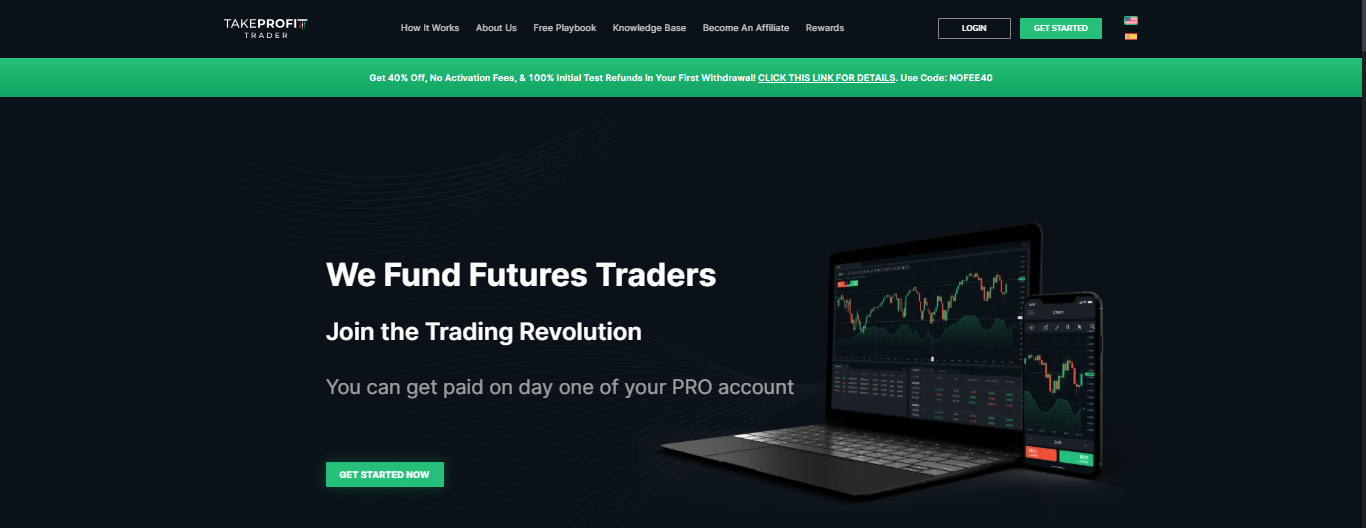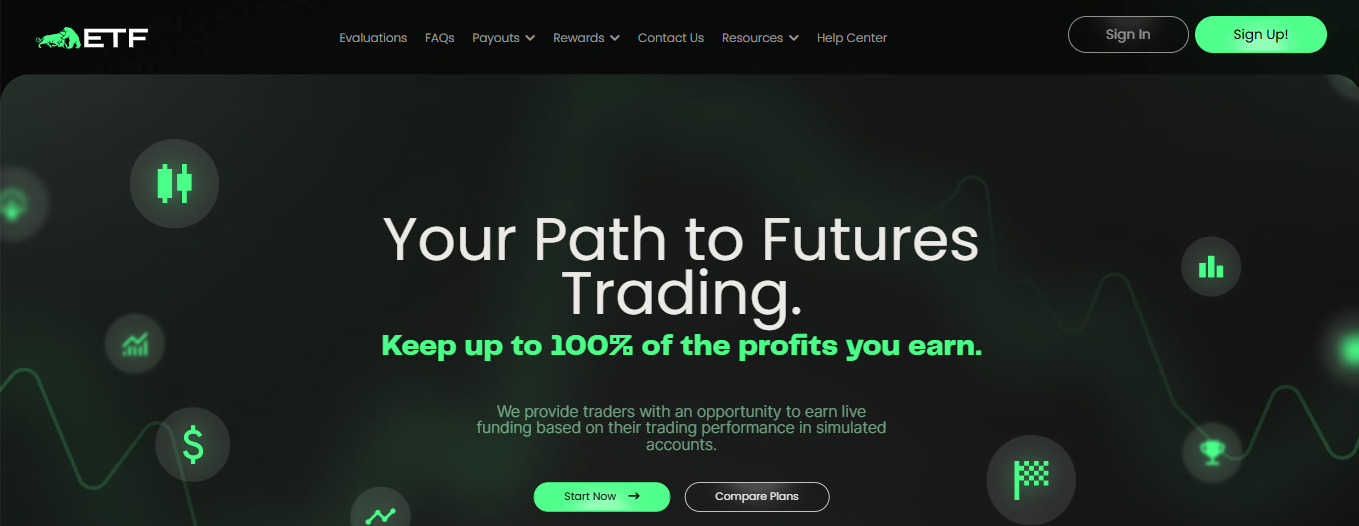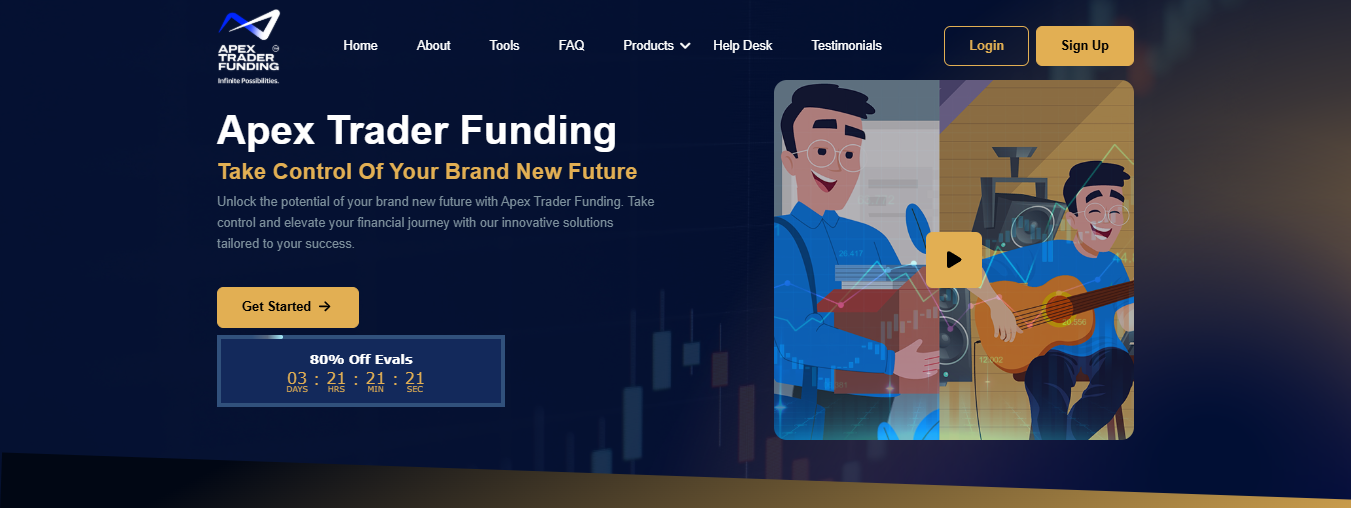Top 5 Futures Prop Firms in 2025
Discover the top Futures Prop Firms in 2025, comparing funding models, trading platforms, and benefits to help you choose the right fit.
.jpg)
Imagine you have a clear trading edge but limited capital, strict drawdown rules, and an opaque profit split standing between you and consistent returns. If you want to know How To Trade Futures Successfully, choosing the right futures prop firm can turn a slight edge into a scalable income stream. What matters most to you: fast execution, low fees, fair profit split, or flexible risk rules? This guide shows how to spot reputable proprietary trading firms, compare funded accounts, and match a firm to your trading style and goals.
AquaFutures offers funded accounts for futures trading that pair real capital with simple rules and fast onboarding, so you can skip long evaluation hurdles and focus on execution, risk management, and growing your account.
Top 5 Futures Prop Firms
1. AquaFutures

AquaFutures stands out as one of the best futures proprietary trading firms in 2025, operating from its base in Dubai, UAE. This firm is built specifically for serious futures traders and offers a transparent and flexible funding model that caters to traders at different skill levels, with funded accounts. The firm is backed by its broker, AquaFunded, which ensures good trade execution and market conditions.
AquaFutures’ dedication to clear, fair trading conditions, combined with flexible funding and a scaling plan, makes it a leading choice for futures traders in 2025. Its focus on rewarding disciplined, consistent traders alongside competitive profit splits and fast payouts sets it apart as a prop firm.
Key features of AquaFutures
- Profit Split: Traders can keep up to 100% of their earnings on the first $15,000 in profits, and thereafter receive up to a 90% profit split based on trading consistency. This tiered profit-sharing rewards disciplined, long-term traders over short-term win streaks.
- Account Sizes: Funding accounts range from $25,000 to $150,000, accommodating a broad spectrum of trader experience and capital needs.
- Evaluation Challenges: AquaFutures offers three main evaluation paths tailored to different trader preferences (1 Phase Beginner, 1 Phase Standard, and Instant Challenge). Fees start as low as $65/month for the Beginner challenge, encouraging accessible entry for newcomers.
- Challenge Details: Profit targets vary by challenge type, typically set between 6% to 8%, with daily loss limits designed to encourage responsible risk management. Evaluation periods are designed without strict time limits, allowing traders to progress at their own pace.
- Leverage: The maximum leverage is set at 1:100 for futures trading, providing traders with ample position sizing capability while managing risk.
- Payout Frequency: Payouts are offered weekly or bi-weekly, depending on the account type, facilitating quick withdrawal of profits. Traders must meet minimum profitability days to qualify for rewards.
- Scaling Plan: Successful, consistently profitable traders can benefit from account scaling, where their trading capital increases over time, enhancing potential earnings.
- Trading Platform: AquaFutures uses ProjectX broker technology with CME Group data feed, ensuring access to high-quality market data and reliable execution.
- Rule Transparency: The firm is known for its clear, straightforward trading rules with no hidden conditions, fostering trader trust and confidence.
- Social Responsibility: Unique to AquaFutures is its commitment to environmental and social impact. By trading with AquaFutures, traders contribute to ocean cleanup and clean drinking water initiatives, combining financial goals with meaningful global impact.
Benefits of Using AquaFutures
- Access to real futures trading capital with flexible funding levels.
- Low-cost evaluation options suitable for beginners and experienced traders alike.
- High profit share encourages long-term sustainable growth.
- Frequent payouts help improve trader liquidity and motivation.
- Clear, transparent rules minimizing surprises or hidden conditions.
- Support from a firm committed to sustainable success and trader empowerment.
- Opportunity to scale up accounts as trading skills prove consistent.
2. Earn2Trade

Earn2Trade is recognized as one of the top futures proprietary trading firms, offering a well-structured path for traders to transition from learning to professional trading. Earn2Trade distinguishes itself with comprehensive educational content, ongoing trader support including webinars, and a phased career development model that incentivizes growth by offering traders increasingly larger funded accounts as they meet profit targets and withdraw earnings.
Overall, Earn2Trade's combination of realistic evaluation programs, competitive profit splits, scalable funding, and futures-focused trading makes it a top choice among proprietary trading firms specializing in futures.
Key Features of Earn2Trade
- Profit split: Traders receive 80% of all profits, with the firm taking 20%.
- Account sizes: Initial evaluation accounts with funding offers depend on the plan chosen.
- Evaluation/challenges: Earn2Trade offers two main assessments (the Trader Career Path® and the Gauntlet Mini™), which are realistic and challenging simulations of live market conditions designed to test trading skill, risk management, and discipline.
- Starting fee: The evaluation programs require an entry fee, with details depending on the selected program and account size.
- Withdrawal and payout process: Traders can withdraw profits (not capital) subject to an 80/20 split, with withdrawal requests processed weekly.
3. Take Profit Trader

Take Profit Trader stands out as one of the top futures proprietary trading firms by offering a streamlined platform focused on getting traders funded quickly and starting profit withdrawals from day one of their PRO account. The firm operates a one-step evaluation process designed to validate a trader’s skills efficiently and offers automated, immediate profit withdrawals, making the trader's earnings accessible without delay.
Take Profit Trader supports over 15 trading platforms, including CQG and Rithmic data feeds, allowing flexibility in trading preferences. The firm uses an end-of-day trailing drawdown for risk management and has recently removed the daily loss limit to provide greater trading freedom.
Key Features of Take Profit Trader
- Profit Split: Profit split with an upgrade option to PRO+ that offers a higher split.
- Account Sizes: Various accounts with corresponding monthly fees.
- Evaluation/Challenges: Only one step to become funded (reaching a profit target with adherence to specific risk rules); no maximum time limit to complete the evaluation; rapid transition to a funded PRO account (about 5 days).
- Starting Fee: One-time fee for the PRO account, with no recurring monthly payments.
- Withdrawal Policy: Withdraw profits immediately starting from day one of the PRO account; profits are paid via automated systems with no delays or holding periods.
4. Elite Trader Funding

Elite Trader Funding is recognized as one of the top futures proprietary trading firms, offering traders the chance to manage live funding based on performance in simulated accounts. They emphasize rewarding traders with a highly favorable profit split and an accessible evaluation process, aiming to foster disciplined and sustainable trading strategies.
Elite Trader Funding stands out due to its attractive payout terms, quick funding process, and varied evaluation options, making it a favorable choice for futures traders seeking funded accounts with flexible and trader-friendly terms.
Key Features of Elite Trader Funding
- Profit Split: Traders keep 100% of profits first, then 90% of profits thereafter.
- Account Sizes: Offers multiple account sizes, with funding available.
- Evaluation/Challenges: Provides various evaluation programs, including 1-Step, End-Of-Day Drawdown, Fast Track (14-day limit), Static, and Diamond Hands challenges designed to suit different trading styles and preferences.
- Starting Fee: Evaluation fees are competitive, with an optional reset fee if the evaluation is failed. The Fast Track challenge is priced differently with a shorter time frame.
- Trading Rules and Platforms: Emphasis on systematic trading with consistent position sizing. Overnight trading is generally restricted.
5. Apex Trader Funding

Apex Trader Funding stands out as one of the top futures proprietary trading firms, founded in 2021 with a clear mission to improve the trader payout model and focus on customer benefits. Based in Austin, Texas, the firm specializes exclusively in futures markets and aims to offer a more trader-friendly approach than its competitors.
Apex Trader Funding also offers flexibility in payouts, allowing traders to request withdrawals of profit, with payouts beginning just 10 days after the first trade in a funded account. Payment options are flexible, including bank transfer, PayPal, Wise, or crypto, ensuring fast and convenient access to profits.
Key features of Apex Trader Funding
- Profit split: Traders keep 100% of the first earnings, and then the profit split shifts to 90%.
- Account sizes: Offers funded accounts, providing room for substantial trading.
- Evaluation/challenges: Uses a straightforward, single-step evaluation process with a profit target and no daily drawdown limits. Traders need as few as seven trading days to qualify.
- Starting fee: Monthly fees vary depending on platform and plan. Options include monthly or one-time lifetime fees.
- Additional features: Traders are allowed to trade on holidays and during news events within specified hours, with a live trailing threshold for risk management visible in their proprietary rTrader software.
Related Reading
- How To Trade Futures Successfully
- What Are Futures In Trading
- What Is The Best Futures Trading Platform
- How Many Futures Trading Days In A Year
- What Is A Point In Futures Trading
- How Much Can You Make Trading Futures
- Can You Trade Futures On TradingView
- How Much To Trade Futures
- When Is The Best Time To Trade Futures
- How Are Futures Similar To Options How Are They Different
- How Is Futures Trading Taxed
- Beginning Futures
- What Time Does Futures Market Open
- Automated Futures Trading
What is a Futures Prop Firm?
.jpg)
Futures prop firms are companies that provide traders with access to capital specifically for trading futures contracts. Instead of using their own money, traders use the firm's funds to trade standardized contracts to buy or sell assets like commodities, currencies, or indexes at a future date. This arrangement allows traders to leverage larger amounts of capital than they might personally have, increasing their potential profits while sharing risk with the firm.
Typically, these firms charge traders a monthly subscription fee to access funded accounts and provide the necessary trading infrastructure, often partnering with established brokers. They generate revenue primarily through profit-sharing arrangements, where the trader keeps a percentage of their profits and the firm takes the rest. The profit split can vary widely but usually falls between 50% and 95% in favor of the trader.
Trading with a futures prop firm offers several advantages beyond just funding. Traders gain access to advanced technology, market data, and educational support. However, these firms usually impose strict rules on trading to control risk, including limits on maximum losses and required consistency in trading performance.
A futures prop firm is a partnership where skilled traders use the firm's capital to trade futures, sharing profits according to agreed terms, benefiting from capital access and professional resources while following conservative risk guidelines.
A good example of such a firm is AquaFutures, which supports traders by providing funded accounts to those with limited capital or those wishing to avoid risking their funds. AquaFutures offers opportunities for traders to grow and trade professionally by combining capital access with responsible risk practices.
Unlock up to 50% off Your First Funded Account for Futures Trading.
AquaFutures gives traders fast, affordable access to funded futures accounts with instant options, simple rules, and honest payouts. Whether you're looking to skip evaluations or grow through performance-based scaling, our programs are designed to reward consistency without unnecessary restrictions.
Join thousands of traders who trust AquaFutures for transparent rules, fast support, and real capital. Ready to take the next step in your trading journey? Explore our account options and get funded today. Unlock up to 50% off your first funded account—plus surprise BOGO deals and bonuses updated weekly.
How to Choose a Futures Prop Firm
.jpg)
Reputation
Check how long the firm has operated and who runs it. Prefer firms with a decade or more of continuous operation and a leadership team that shows trading or risk management experience. Ask for proof of funded trader payouts and audited or verifiable performance claims. Look beyond anonymous forum posts. Who are their brokerage partners, which clearing firms do they use, and can they name institutional clients or third-party validators? What do other funded traders say about withdrawal speed and contract enforcement?
Trading Costs
List every recurring and one-time cost before you apply. That includes evaluation fees, monthly subscriptions, market data fees, exchange and clearing fees, commission per contract, platform fees, and any account maintenance fees. Ask whether spreads, slippage, and latency cause hidden costs. Confirm who pays exchange and clearing fees and how the firm bills them. Compare the cost structure against your expected trade volume and average holding time to see if the model makes sense for scalping, intraday, or swing approaches.
Profit Sharing
Aim for a profit split that favors the trader. Many competitive firms offer splits of 80 percent or higher, with top programs paying above 90 percent after a ramp-up. Ask about the split on scaled accounts and whether the share changes over time. Confirm minimum payout thresholds, payout frequency, payment methods, and whether taxes or processing fees are deducted before you receive funds. Does the firm require a minimum trading period before your first withdrawal?
Asset Selection
Verify the complete instrument list and whether the firm restricts tick sizes or contract months. Most firms provide access to CME products across equities, interest rates, commodities, energy, metals, and forex futures. Check for micro contracts if you trade small sizes, and confirm availability of low-latency instruments during active hours. Ask about margin levels per contract, position size caps, and whether some contracts require prior approval. Can you trade overnight or around major economic releases?
Trading Platform Options
Confirm supported trading platforms and broker gateways. Look for firms that offer low-latency connectivity through providers like Rithmic, CQG, or Trading Technologies and platforms such as NinjaTrader, Sierra, MultiCharts, or TT if you run automated systems. If you use algorithmic trading, ask about API access, execution speed, order types, and whether you can host strategies on a VPS near their servers. Is multi-account management supported, and does the firm permit copying between your accounts
Permitted Trading Strategies
Request the written policy on permitted and banned strategies. Some firms allow any legal method, others restrict scalping, news trading, hedging across accounts, or inter commodity arbitrage. Ask specifically about overnight positions, holding through economic releases, automated and high-frequency systems, and using external liquidity or broker aggregation. How do they treat accidental rule breaches, and what is the appeals process for disputed rule violations
Risk Rules and Evaluation Process
Understand evaluation stages, profit targets, drawdown rules, daily loss caps, and allowed max position size. Know whether the program uses fixed dollar drawdowns, percent-based rules, or trailing drawdowns. Clarify whether the evaluation is a one-step challenge or a multi-step verification, and whether retests cost extra. Ask how they calculate realized versus unrealized P&L and how they treat marked-to-market during slow liquidity periods. Do they provide live trade logs and replay tools for you to review contentious trades?
Account Scaling and Funding
Find out the firm's scaling plan and the timeline for larger capital. Does performance automatically trigger scaling, or is it discretionary? What are the thresholds for increases, and are there time-based minimums you must meet before scaling? Ask whether they offer scaling based on risk-adjusted metrics, not just raw profit, and whether they split accounts across strategies for diversification.
Legal Terms and Intellectual Property
Read the contract for ownership of code, non-compete clauses, confidentiality rules, and termination rights. Does the firm claim rights to your algorithms or trading methods if you use their funded account? Confirm KYC requirements, tax reporting, and whether any cooling off period exists before they can close your account without cause.
Customer Support and Operations
Test response times before you commit. Reliable firms offer support during futures market hours and fast escalation for trade disputes, payout questions, and technical outages. Ask for an onboarding specialist and documentation of escalation procedures. Do they keep complete trade records and provide downloadable statements for audits?
Security, Custody, and Broker Relationships
Confirm where funds reside and who clears the trades. Firms that place accounts with established futures brokers and clearing houses reduce counterparty risk. Ask whether client funds are segregated from firm operating accounts and whether the firm is a member of recognized exchanges or uses regulated clearing brokers.
Performance Transparency
Look for firms that publish net of fees performance and provide granular trade-by-trade statements. Beware firms that show only gross P&L or use cherry picked examples. Can you get a sample monthly statement and a copy of their payout ledger before signing
Community, Training, and Tools
Some firms offer coaching, backtesting tools, market data, and community channels. Decide which of these add real value to your edge and which are sales features. Do they host webinars, provide strategy vetting, or offer sandbox accounts for testing strategies without financial risk?
Fraud Signals and Red Flags
Avoid firms that hide contract terms, refuse to show payout history, or make unrealistic claims about guaranteed profits. Watch for complex fee structures that change after signup, non-transparent dispute procedures, and poor customer reviews that cite withheld payouts. If the firm pressures you to pay repeatedly for upgrades or private coaching to access funds, walk away.
Questions to Ask Before You Apply
- What is the exact profit split, and how is it calculated
- What are all the fees, including data and clearing
- What are the evaluation rules and retest costs
- Which instruments are allowed, and what are the position limits
- Which platforms and APIs are supported
- How fast are payouts, and what is the withdrawal minimum
- Who owns the intellectual property for my code
- Where are accounts cleared, and how are funds held
Related Reading
- Futures Trading Example
- Futures Trading Algorithms
- Stocks Vs Futures
- Futures Backtesting
- How To Buy Copper Futures
- Practice Futures Trading
- Futures Swing Trading
- Automated Futures Trading Strategies
- Most Volatile Futures
Assets You Can Trade with a Futures Prop Firm

When trading with a futures prop firm, the types of assets you can trade primarily depend on the brokers and exchanges the firm is connected to. Most futures prop firms offer access to a broad selection of futures contracts, many of which are listed on major exchanges like the CME Group, including CME, CBOT, NYMEX, and COMEX.
Most futures prop firms provide opportunities to trade the following categories of futures contracts:
1. Equity Futures
Prop firms usually offer headline index futures such as S&P 500 (ES), Nasdaq 100 (NQ), and Dow (YM). You will also find E micro contracts that lower capital needs, plus single stock futures where available. Index futures give you broad market exposure with deep liquidity, tight spreads, and ample order flow for intraday strategies. Single stock futures trade with different liquidity profiles and can suit hedging or pairs trading when the firm supports them.
2. FX Futures
Currency futures like Euro USD (6E), British Pound (6B), and Japanese Yen (6J) trade on regulated exchanges and appear in prop firm offerings. They differ from retail spot forex by running on standardized contract sizes, clearing through exchanges, and having transparent margins. Many traders prefer FX futures inside a prop program because exchange clearing reduces counterparty risk, and platform rules enforce order and fill quality.
3. Agricultural Futures
Expect corn (ZC), soybeans (ZS), wheat (ZW), and other grain contracts listed on CBOT. These contracts have seasonal supply and demand drivers, defined delivery months, and observable inventory reports that move prices. Agricultural futures often show higher spreads and different intraday volatility than financial futures, so position sizing and roll strategy matter for swing trades and hedges.
4. Energy Futures
Crude oil (CL), natural gas (NG), gasoline (RB), and heating oil (HO) are staples on NYMEX and draw high volume and volatility. They support diverse strategies from scalping to systematic trend entries. Energy markets can gap on inventories, geopolitical events, and storage reports, so traders using prop capital must align margin rules and intraday risk limits with contract behavior.
5. Interest Rate Futures
Treasury futures cover 2, 5, 10, and 30-year durations, and Eurodollar and SOFR futures provide cash rate exposure. These contracts enable hedging against rate moves and executing curve trades such as butterflies and steepeners. Prop firms often allow spread trades between contract months and across maturities, which depend on their allowed strategies and margin offsets.
6. Metal Futures
Gold (GC), silver (SI), and copper (HG) are commonly available and suit both macro and seasonal trades. Precious metals respond to monetary policy, haven flows, and jewelry demand, while copper follows industrial cycles. Metals typically present lower liquidity than index futures but remain popular for volatility-based approaches and hedge overlays.
7. Cryptocurrency Futures
Many prop firms now provide CME Bitcoin and Ether futures, which are cash-settled and trade on regulated venues. These replace the need to hold spot crypto on custodial exchanges while giving access to crypto volatility inside a funded account. Some firms also link to crypto derivatives venues for perpetuals, but that depends on their broker integrations and risk framework.
Key Points About Futures and Prop Firm Trading
- Futures contracts traded via prop firms have specific expiration dates and standardized terms, allowing for transparent pricing and regulated trading environments.
- Trading futures provides opportunities to go long or short, hedge existing positions, and leverage capital efficiently due to margin trading features.
- The selection of offered futures contracts may vary depending on the firm’s broker partnerships, but usually covers major asset classes mentioned above.
Pros and Cons of Futures Prop Firms
.jpg)
Pros of Futures Proprietary Trading (prop) Firms
Access to Significant Capital
Futures prop firms provide traders with access to large amounts of trading capital, often far exceeding what an individual trader could afford alone. This capital enables traders to take larger positions in the market, thereby enhancing potential profit opportunities without risking personal funds. The amount of capital allocated typically depends on the trader’s skill, experience, and performance during evaluation phases.
No Personal Capital at Risk
A key benefit of trading with a prop firm is that traders do not have to risk their own money. The firm supplies the trading funds, which reduces the personal financial burden and stress for traders. This structure allows traders to focus on developing and executing strategies without the fear of losing their capital, providing a safer environment to learn and trade actively.
Strict Risk Management Enforcement
Prop firms enforce disciplined risk management rules to protect both the firm’s capital and the trader’s performance. These guidelines often include daily loss limits, maximum position sizes, and mandatory use of stop-loss orders. Traders receive training on risk management techniques such as position sizing and diversification, which help minimize losses and preserve capital during volatile markets. The firm monitors adherence strictly to maintain overall portfolio stability.
Advanced Trading Technology and Resources
Most futures prop firms equip traders with cutting-edge trading platforms, real-time market data, algorithmic tools, and analytical software. Access to these technological resources enhances decision-making speed and accuracy, giving traders a competitive edge. Additionally, many firms foster collaborative environments where traders can share insights and learn from each other.
Professional Development and Mentorship
Prop firms often provide comprehensive training programs and mentorship opportunities, supporting traders in refining their skills and strategies. This guidance benefits both new and experienced traders and encourages disciplined trading habits and effective risk control.
Performance-Based Compensation
Traders at prop firms typically earn a share of the profits they generate, aligning their success with the firm's overall performance. This incentivizes traders to optimize their trading results and improves motivation, as higher performance directly translates into higher earnings.
Community and Networking Opportunities
Joining a prop firm connects traders with a network of professionals, fostering a community of shared knowledge and strategies. This collaborative environment promotes continuous learning and professional growth.
Reduced Stress and Flexibility in Trading Styles
Especially in futures swing trading prop firms, traders can focus on higher time frames (daily or weekly charts), reducing the need for constant screen monitoring. This lowers stress levels and trading costs, as fewer trades mean fewer commissions and spreads, making trading more manageable alongside other commitments.
Cons of Futures Proprietary Trading (prop) Firms
Monthly Subscription Fees
Many futures prop firms require traders to pay recurring monthly fees to participate in trading challenges or maintain funded accounts. These fees cover access to platforms and real-time data feeds. Traders must be aware that these payments continue until explicitly canceled, which can add substantial cost pressure, especially if they do not quickly qualify for funded accounts or fail challenges multiple times. Reset fees for failed challenges add further financial burden.
Restrictive Trading Conditions
Prop firms commonly impose strict trading rules, such as daily maximum loss limits, restrictions on holding overnight positions, banning trading around major news events, and limiting position sizes or trade frequency. These constraints can severely limit a trader’s strategy flexibility, especially in volatile futures markets where occasional larger drawdowns or holding positions through market events may be necessary. Additionally, some prop firms tighten rules mid-challenge, creating unpredictability and increasing the difficulty of passing evaluations.
Related Reading
- Where To Trade Futures
- How To Trade In Currency Futures
- How To Trade Futures With A Small Account
- Best Futures To Trade At Night
- Best Futures Prop Firms
- Best Automated Futures Trading System
- Futures Trading Tools
- Futures Swing Trading Prop Firm
- Best Brokers For Futures Trading
Unlock up to 50% off Your First Funded Account for Futures Trading
AquaFutures gives traders fast, affordable access to funded futures accounts with instant options, simple rules, and honest payouts. Whether you're looking to skip evaluations or grow through performance-based scaling, our programs are designed to reward consistency without unnecessary restrictions.
Join thousands of traders who trust AquaFutures for transparent rules, fast support, and real capital. Ready to take the next step in your trading journey? Explore our account options and get funded today. Unlock up to 50% off your first funded account—plus surprise BOGO deals and bonuses updated weekly.
.png)





